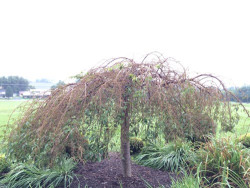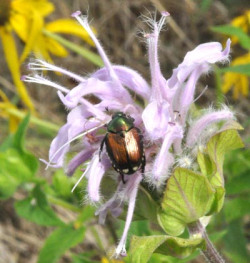Alternatives for Japanese Beetle Control
By Lee Townsend, Extension Entomologist
Japanese beetle numbers appear to be up in many areas, and landscapes with plants these insects prefer could be under siege for the next 2 to 3 weeks. Turf and ornamental insecticides containing pyrethroids (bifenthrin, cyfluthrin, cypermethrin, permethrin, etc.) can provide very good long-term control. However, these insecticides are harmful to pollinators and must not be applied to blooming plants. The extended residual effect of pyrethroids also applies to natural enemies. Damage to natural enemies can lead to problems with other pests, such as spider mites. This leaves many people interested in alternative approaches to Japanese beetle control.
Alternative Management Options
No single solution fits all situations, but practical assistance may be found in one or more of these alternatives:
Physical protection.
Drape fine netting over preferred host plants to deny beetles access to attractive plants. Monitor general beetle activity in order to remove the cover as early as possible.
Removal of buds and early blooms
Cut and bring highly attractive flowers, such a roses, indoors for enjoyment.
Prevent buildup
Volatiles produced by Japanese beetle-damaged plants attract more of these voracious insects. When practical, make early morning and afternoon visits to infested plants to knock beetles into a container of soapy water. Keeping Japanese beetle numbers low on plants means less plant damage, as well as less attraction to other Japanese beetles.
Insecticides
Pyola Insect Spray (pyrethrins and canola oil) and other pyrethrins sprays provide broad spectrum insect control alternative. Both active ingredients are contact insecticides that provide very short residual protection. As with all insecticides, follow the label directions on protecting pollinators. Insecticidal soap and horticultural oils also provide contact control. Check the label for warnings regarding sensitive plants or restrictions due to high temperature. Products based on extracts of hot peppers, oranges, garlic, and the physical protectant kaolin did not provide effective control in University of Kentucky trials.
Do not use traps
UK research has shown beetle traps to be ineffective. Large numbers of beetles will respond to the attractants but few are captured. This can result in greater beetle damage than would have occurred without the traps.


Severe Japanese beetle defoliation Japanese Beetle

